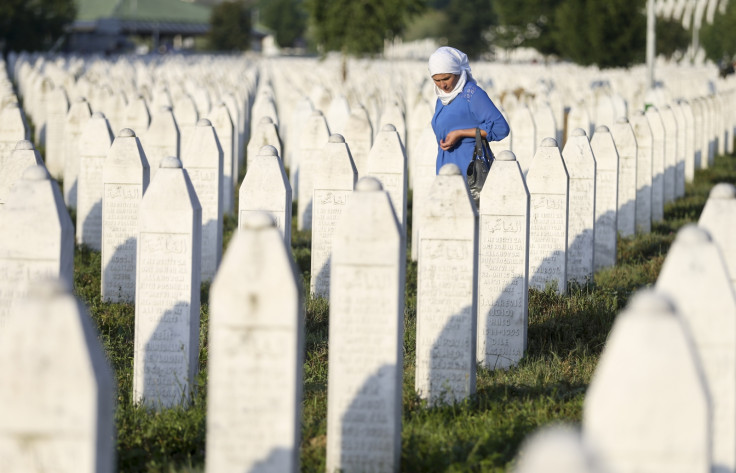The bloody legacy of Ratko Mladic can be found in Myanmar and the minds of jihadis
Evidence shows that Muslims worldwide began to feel insecure after the Bosnian war.
A fearful symmetry is shaping up: an earlier ethno-religious crusade in Bosnia is resurfacing in another place, Myanmar, far away from the Balkans. The victims were and are Muslims, most of them civilians, who did not 'invite' or deserve the savagery. In Bosnia their persecutors were Serbs; in Myanmar they are Buddhists.
"We are the Jews of this century. Everyone wants us to die, even though many of us did nothing bad," said Ahmed, a desolate young man I recently met at an event. He is an artist, but he can't work as he is "too angry and afraid". I advised him to go to City Circle, a Muslim organisation that organises thoughtful conversations and attracts professionals. I know how he feels. When Muslim boys and men in Srebrenica were massacred in July 1995, we had a Bosnian nanny. As she sobbed I felt the blood rise in me. In my younger days such mass murders might have turned me into a reckless insurgent.
This is how so many Muslims, many highly educated, become radicalised or militant jihadis. Their destructive behaviours emerge from historical and contemporary conflicts. That does not excuse what they do, but does help us understand the psychoses they develop.
A cautionary note: some jihadis, including Isis leaders, are embarking on their own religious cleansing wars. Around the world they torture and kill fellow Muslims without pity or compunction. Saudi-sponsored terrorism is a separate, sinister strand with its own aims and momentum. These nihilists and brigands need no reason to do what they do. But they are smart and can turn distressed or ethical Muslims who believe in justice.
Memories of Bosnia came rushing back as General Ratko Mladic, nicknamed "The Butcher of Bosnia", was sentenced to life imprisonment by sombre judges in The Hague. He was found guilty of attempted extermination, ethnic cleansing and crimes against humanity. His ally, the Bosnian Serb nationalist Radovan Karadzic, a psychiatrist and poet, was sent down for life in 2016. Between 1992 and 1995, around 64,000 Muslim Bosnians, including young boys, were slaughtered by Serb soldiers led by these two men. Douglas Hurd, then foreign secretary, was a non-interventionist and Bill Clinton eventually persuaded Nato to send in troops and help end the unequal war, but Muslims have never recovered from what happened.

Evidence shows that Muslims worldwide began to feel insecure after the Bosnian War. The jihadi message suddenly made sense. Younger generations became more combative than their elders. Robert Fisk described meeting one such youth. "He was deeply upset by reports of the mass rape of 20,000 Muslim women in Bosnia – the figure may have been exaggerated, but the West certainly did nothing to prevent these atrocities."
Western Muslims fighting for Isis must surely have been "radicalised" before they left their homes in Europe or America. We put this down to the internet, crazed preachers and a mumbo-jumbo version of religion. But isn't there also a legacy of history here? Did we think we'd get away with Palestine in 1948? Or Bosnia in 1992? Or Iraq in 2003? Doesn't injustice get a look in anymore?
This year, the US Senate Committee on Foreign Relations concluded: "Radicalisation of Muslims in the Balkans has to be understood within the context of the recent history of armed conflicts in the 1990s, which opened a window for outside proselytising influences on Muslim communities. It did so in two ways. First, the inflow of the foreign Mujahedeen from the battlefields of Afghanistan introduced various ideologies initially foreign to the Balkans, a trend that continued in the post-conflict era through foreign (or foreign-educated) clerics, NGOs and Internet based platforms. Secondly, the extreme form of violence used against Muslims during the conflicts of the 1990s, including the campaigns of ethnic cleansing and genocide, have coloured the post-war perceptions of the Muslim population, in some cases creating a fertile ground for the recruitment into radical beliefs and practice of Islam."
Now Rohingya Muslims are being raped, dispossessed, killed in Myanmar. Almost a million have fled. One cannot hear their stories without red rage. And the world watches. Hundreds of foreign companies are investing in the country where wages are abysmally low. Aung San Suu Chi shows contemptible indifference to this man-made calamity. Serbs backed their soldiers and the people of Myanmar back their vicious army.
Look online and this is now the most burning issue for countless Muslims. I myself have spoken to students who are convinced there is a war on Muslims and that they must think of themselves as "soldiers'. A new wave of radicalisation is on its way. We learn nothing from history. So, as the philosopher George Santayana warned, we are condemned to repeat it.
© Copyright IBTimes 2025. All rights reserved.






















